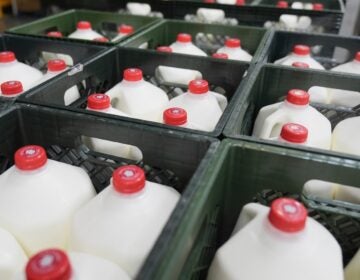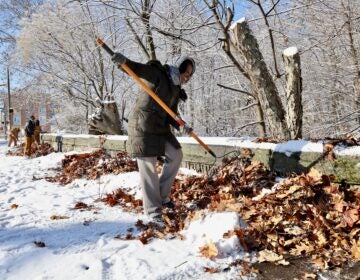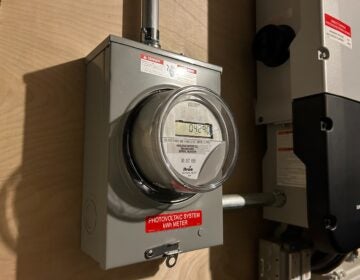Philadelphia food banks rush to meet increased demand amid SNAP freeze
Gov. Josh Shapiro is setting aside $5 million to aid food banks during the SNAP freeze. But nonprofits say more is needed.
Listen 1:14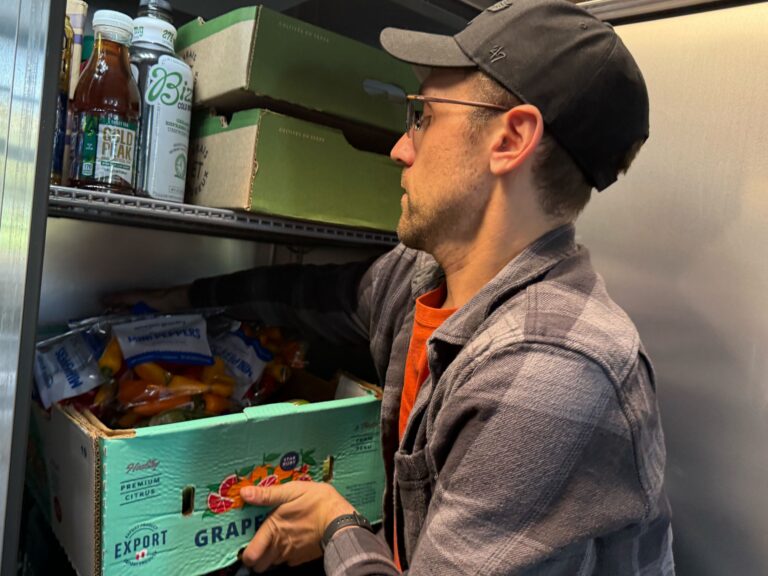
Lutheran Settlement House in Fishtown already is seeing double the amount of clients it normally serves and is purchasing more food than previously. (Zoë Read/WHYY)
SNAP funding freeze: What to know
- 42 million people — about 1 in 8 Americans — rely on SNAP
- Locally, that includes nearly 2 million people in Pa., with roughly 685,000 in the Philadelphia region, and more than 800,000 in New Jersey
- Here’s how to find other free food resources in the Philly region and in South Jersey, and how to help
As the rain crashed down in Philadelphia’s Fishtown neighborhood Thursday morning, dozens of residents lined up outside the Lutheran Settlement House.
The food bank is now serving double the number of clients, leading the nonprofit to source food from other donor organizations to meet the increased demand. On Thursday, Lutheran Settlement House served 115 visitors, compared with a typical day of 30 clients.
Food banks nationwide are bracing for a surging need for groceries as benefits from the Supplemental Nutrition Assistance Program, commonly known as SNAP, freeze amid a government shutdown that has lasted for more than four weeks.
“Everyone who comes to us for assistance is leaving with something, but I don’t think they’re leaving with enough,” said David Chiles, executive director of Lutheran Settlement House. “If SNAP benefits are frozen, there’s no way for social service organizations and the hunger relief network to manage that loss of funds, and that’s going to be devastating for us.”
Lutheran Settlement House is just one Philadelphia food bank that is reporting an increased volume of applications for free meals. The organization is purchasing more food than ever before.
Pennsylvania Gov. Josh Shapiro signed a disaster declaration Friday to direct $5 million in state funding to the nonprofit organization Feeding Pennsylvania to help food banks purchase more healthy food, including from local farmers.
Food banks are hopeful the funding will help them meet the demand. However, the funding doesn’t match the $366 million in monthly SNAP benefits Pennsylvanians receive, and food banks continue to urge the federal government to keep SNAP benefits afloat.
“I’m incredibly grateful for our state and county governments stepping up to help fill the gaps left by the failures of our federal leadership,” said George Matysik, executive director of ShareFood program. The organization distributes food assistance to food pantries across the Philadelphia area, which collectively serve more than 500,000 people a month, according to Matysik.
“Hunger doesn’t take a break, and neither can we. A freeze of SNAP benefits is unacceptable and while this $5 million infusion is much needed, it won’t take the place of missing federal investment,” he added.
SNAP provides food assistance for 42 million people in the U.S. — about 70% of whom are children, people living with disabilities or older adults.
Philadelphia nonprofits say the city, which already has higher rates of food insecurity, will be hit hard by the freeze. More than 470,000 residents in the city rely on SNAP to put food on their tables, according to Pennsylvania Department of Human Services data.
“People are going to go hungry,” Chiles said, holding back tears. “I get emotional thinking about it, because the impact is that someone’s going to get hungry, that a child is going to be hungry, and there is not going to be food, and that one of our elders is going to be hungry.”
The freeze will impact people like Starlene Martin, who has used SNAP for more than two years. The Philadelphia resident relies on Social Security, which doesn’t provide enough income to pay for all of her bills and necessities. SNAP helped Martin free up her wallet to prevent getting behind on rent and utilities.
“I didn’t have to juggle and say, ‘I gotta get food, so I’m not gonna pay my electric bill.’ When I had SNAP, I could do all my bills and then use my SNAP to go to the market,” she said. “I really relied on that to get my food and stuff. So now I’m no longer gonna get it.”
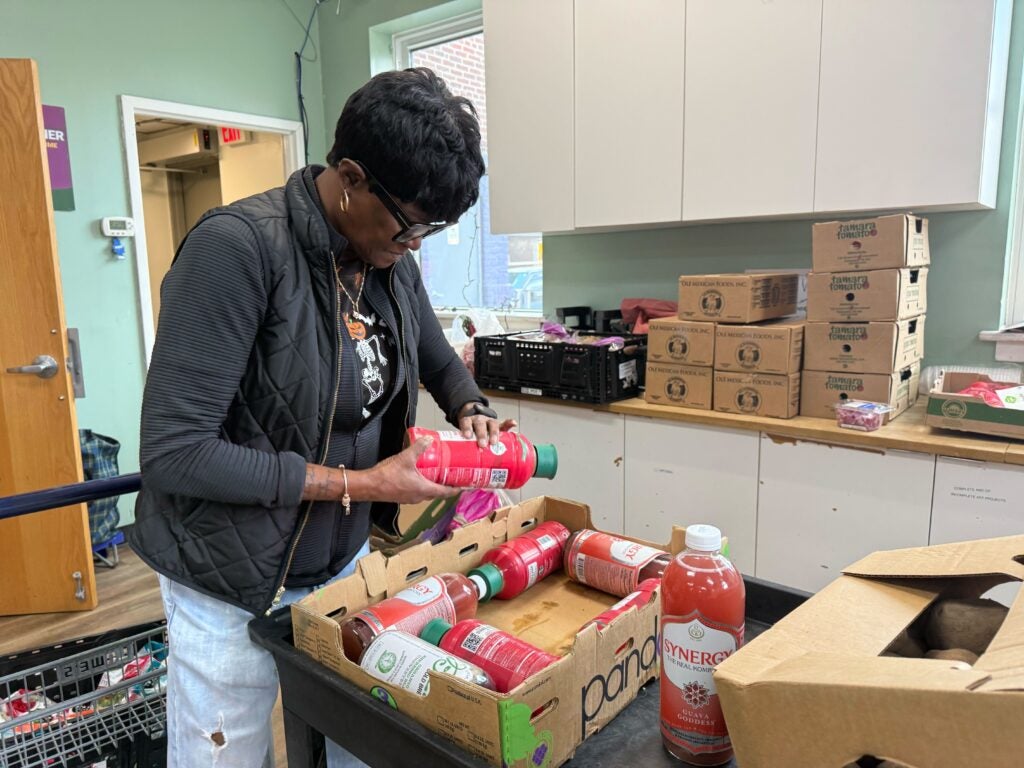
But Martin, who also volunteers at Lutheran Settlement House, said she worries most about the families who will be impacted.
“These kids are the ones that’re gonna suffer through all this,” she said. “A lot of them don’t get a good meal until they go to school, and imagine coming home in the evenings, opening up the refrigerator and there’s nothing in it. It’s gotta be heartbreaking.”
Two federal judges on Friday ruled that President Donald Trump’s administration must continue to fund SNAP after more than two dozen states, as well as a coalition of local governments, small businesses, nonprofits and workers’ rights organizations, sued the administration’s decision to freeze food stamps during the shutdown. The Trump administration has said the law doesn’t allow the government to use a $5 billion contingency fund to support SNAP. However, the U.S. Department of Agriculture tapped into similar funds during the shutdown in late 2018 to early 2019.
It’s not clear when debit cards used to purchase groceries through the program could be replenished, but the process often takes up to two weeks. The rulings are also likely to face appeals.
“As a food bank, we deal with many types of crises, from health crises to hurricanes. But nothing has been quite like this,” Matysik said. “Our several million dollars in purchasing would only be a drop in the bucket compared to what the SNAP program does for this region. To think that we as food banks and food pantries can pick up all of the gaps that will be made here is just unreasonable.”
Bill Golderer, president and CEO of the United Way of Greater Philadelphia and Southern New Jersey, agreed. The organization, which operates the state’s service hotline 211, has seen an uptick in calls for hunger relief.
“On the very surface level, you’re talking about an inability for very high performing and very efficient food banks that have thousands of pantries in houses of worship, in community centers, not being able to supply the food that people have come to count on every week after week,” Golderer said. “Now, you’re looking at empty shelves, and there’s no amount of philanthropy that can make up for this emergency food system that we built over decades.”
A number of community-led efforts are underway to help mitigate the impacts of the SNAP freeze.
In Philadelphia, Councilmember Jamie Gauthier is distributing about 600 pounds of fresh produce and groceries every Thursday outside her district office. She began the initiative about a year ago to help residents who are food insecure, but said Friday that the need for food donations has become more urgent since the government shutdown.
“We’re usually able to give out all the food. We have a pretty healthy crowd of people who come every week, and I expect that to increase,” Gauthier said. “People are worried about this. Half a million Philadelphians depend on this benefit, and so this will impact people’s real ability to put food on the table and sustain their families and they’re aware of it.”
Kathryn Nolan is a volunteer with the South Philly Community Fridges, a mutual aid organization made up entirely of community members that provides 24/7 access to fridges and pastries. She said the tight-knit South Philly community has stepped up to help their neighbors during this time of need.
“I would say in South Philly, if you’re not a person who is experiencing hunger, you definitely know someone in your family who is, or a neighbor. So, it is very close to home and community is everything,” Nolan said.
“I also think that a lot of people are going to be going hungry, which is a massive human rights violation and something that our government should be ashamed of. Seeing people get that news and immediately say, ‘Okay, what can we do to help?’ To me, that’s what Philly stands for.”

Get daily updates from WHYY News!
WHYY is your source for fact-based, in-depth journalism and information. As a nonprofit organization, we rely on financial support from readers like you. Please give today.



